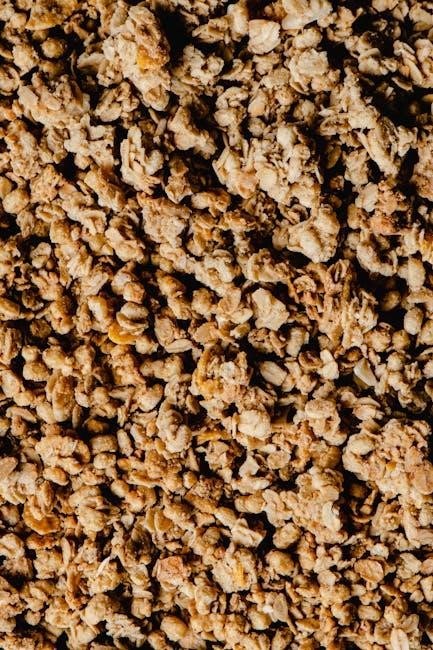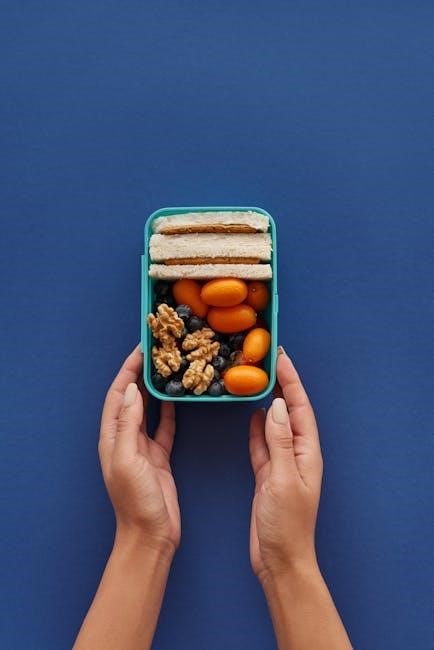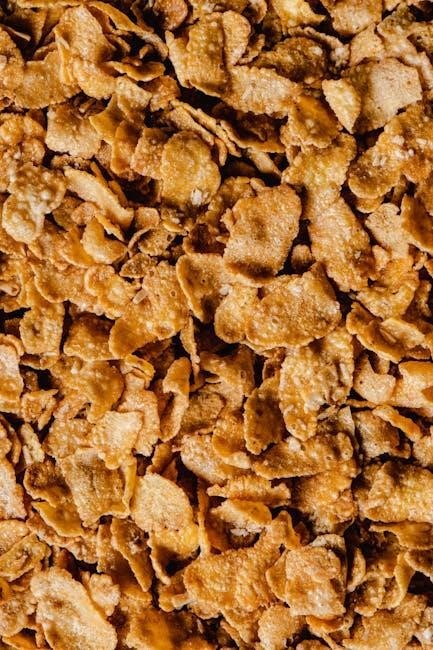A bulking meal plan is a strategic approach to gaining muscle mass through a calorie-surplus diet rich in protein, carbs, and healthy fats. These structured plans, often available as free PDF downloads, provide guidance to help you achieve your fitness goals without excessive fat gain, offering flexibility for different calorie needs, from 3000 to 4500 calories daily.
What is a Bulking Meal Plan?
A bulking meal plan is a structured dietary strategy designed to promote muscle growth by consuming a calorie-surplus diet. It focuses on high-quality foods rich in protein, carbohydrates, and healthy fats to support lean muscle gain. These plans, often available as downloadable PDF guides, provide detailed meal schedules, portion sizes, and recipes tailored to individual calorie needs, typically ranging from 3000 to 4500 calories daily. The goal is to ensure a consistent intake of nutrients while minimizing excess fat accumulation, making it ideal for those aiming to build muscle effectively and sustainably.
The Purpose of a Bulking Meal Plan
A bulking meal plan is designed to help individuals gain lean muscle mass by providing a structured approach to consuming a calorie-surplus diet. Its primary purpose is to ensure a steady intake of nutrients, including protein, carbohydrates, and healthy fats, to fuel muscle growth and recovery. These plans are tailored to individual needs, often available as downloadable PDF guides, and offer flexibility for different calorie requirements. The goal is to support muscle development while minimizing excess fat gain, making it an essential tool for bodybuilders and fitness enthusiasts aiming to achieve their physique goals effectively and sustainably.
Why Use a PDF Meal Plan?
Using a PDF meal plan for bulking offers convenience, organization, and clarity. These plans are often downloadable for free, providing a structured guide to help you stay on track with your calorie and macronutrient goals. PDF formats are easy to print or access on mobile devices, making meal planning portable and hassle-free. They typically include detailed meal breakdowns, grocery lists, and recipes, ensuring you never run out of ideas. Additionally, PDF meal plans are customizable to suit different calorie needs, whether you’re aiming for 3000, 4000, or 4500 calories daily. This makes them a valuable resource for anyone looking to build lean muscle efficiently and sustainably.

Importance of a Bulking Meal Plan
A bulking meal plan is essential for gaining muscle mass efficiently. It ensures a calorie-surplus diet, promotes organization, and balances nutrients while minimizing junk food consumption. A structured plan helps maintain consistency, preventing overeating and ensuring steady muscle growth without excess fat.
Muscle Growth and Recovery
Adequate nutrition is critical for muscle growth and recovery during bulking. A calorie-surplus diet ensures your body has enough energy to repair and build muscle tissue after intense workouts. High-quality protein sources, such as lean meats and eggs, are essential for muscle synthesis, while carbohydrates provide the energy needed for training. Healthy fats support hormone production, which is vital for muscle growth. Timing meals around workouts and spacing them evenly throughout the day can enhance recovery and promote lean muscle gain. A structured meal plan helps maintain consistency, ensuring your body always has the nutrients it needs to recover and grow effectively.
Calorie-Surplus Diet Explained
A calorie-surplus diet is the cornerstone of any effective bulking strategy. It involves consuming more calories than your body burns, creating an energy surplus that fuels muscle growth. This surplus allows your body to allocate extra energy toward building and repairing muscle tissue, especially after intense workouts. A well-structured surplus ensures that weight gain is primarily lean muscle rather than fat. Typically, a daily surplus of 250-500 calories is recommended, depending on individual factors like metabolism and activity level. By carefully planning meals to meet this surplus, you can support steady muscle growth while maintaining overall health and fitness goals.
Minimizing Fat Gain While Bulking
While bulking, it’s crucial to minimize fat gain to ensure lean muscle growth. This can be achieved by maintaining a clean diet focused on nutrient-dense foods like lean proteins, whole grains, and healthy fats. Avoid excessive junk food and empty calories, as they lead to unnecessary fat storage. Tracking macronutrient intake and ensuring a moderate calorie surplus (250-500 calories above maintenance) helps direct energy toward muscle growth rather than fat accumulation; Incorporating regular cardio sessions and strength training also supports fat loss while building muscle. Consistency and patience are key, as a clean bulk takes time but yields sustainable, lean results.

Key Foods for a Successful Bulking Diet
Focus on high-protein foods like chicken, fish, and eggs, carbohydrate-rich foods such as whole grains and potatoes, and healthy fats like nuts and avocados to fuel muscle growth and energy.

High-Protein Foods for Muscle Building
High-protein foods are essential for muscle building, as they provide the necessary amino acids for muscle repair and growth. Include lean meats like chicken, turkey, and fish, as well as eggs, lean beef, and pork. Plant-based options like legumes, beans, tofu, and tempeh are also excellent. Dairy products, such as Greek yogurt and cottage cheese, offer high-quality protein. Additionally, protein powders like whey and plant-based alternatives can supplement your diet. Aim to consume 1.2–2.2 grams of protein per kilogram of body weight daily, spread across 5–6 meals to maximize muscle synthesis and recovery. These foods are foundational to a successful bulking diet.
Carbohydrate-Rich Foods for Energy
Carbohydrates are vital for providing energy during workouts and supporting muscle recovery. Focus on whole, complex carbs like oats, brown rice, quinoa, and whole-grain bread, which offer sustained energy release. Starchy vegetables such as sweet potatoes, potatoes, and corn are also excellent choices. Fruits like bananas, berries, and apples provide quick energy and essential nutrients. Legumes, including beans and lentils, offer a mix of carbs and protein. These foods help fuel intense training sessions and aid in muscle growth, making them a cornerstone of a bulking diet. Incorporate a variety of these carb sources to maintain energy levels and support your fitness goals.
Healthy Fats for Hormone Production
Healthy fats are essential for hormone production, particularly testosterone, which supports muscle growth. Include sources like avocados, nuts, seeds, olive oil, fatty fish (salmon, mackerel), and egg yolks. These fats provide omega-3 and omega-6 fatty acids, crucial for hormonal balance. Avocados add creaminess to meals while boosting calorie intake. Nuts and seeds offer a convenient snack rich in healthy fats. Fatty fish supports heart health and muscle function. Olive oil enhances meal flavor and provides monounsaturated fats. Incorporating these foods ensures adequate fat intake, supporting muscle recovery and growth during bulking. They also contribute to overall health, making them a vital component of a well-rounded diet plan.

Sample Bulking Meal Plans
Explore customizable bulking meal plans ranging from 3000 to 4500 calories, designed to fuel muscle growth. These plans, often available as PDF downloads, provide structured meal guidance tailored to your goals, ensuring a balance of protein, carbs, and healthy fats while minimizing fat gain. Whether you’re aiming for lean muscle or bulk, these plans offer flexibility and practicality to suit your dietary needs and preferences.
3000-Calorie Meal Plan
A 3000-calorie meal plan is ideal for individuals aiming to gain lean muscle mass while minimizing fat accumulation. This plan typically includes 5-6 meals per day, ensuring a consistent flow of nutrients to support muscle growth and recovery. Breakfast might feature scrambled eggs, whole-grain toast, and avocado, providing a balance of protein, carbs, and healthy fats. Lunch could include grilled chicken, brown rice, and steamed vegetables, while dinner might consist of a lean beef burger, sweet potatoes, and broccoli. Snacks such as Greek yogurt, nuts, or protein shakes are added to meet the calorie and macronutrient goals. This plan is customizable and should be paired with regular workouts for optimal results.
4000-Calorie Meal Plan

A 4000-calorie meal plan is designed for individuals with higher energy needs, such as advanced lifters or those with faster metabolisms. This plan emphasizes nutrient-dense foods to maximize muscle growth while keeping fat gain minimal. Meals are typically spread across 6-7 eating occasions, ensuring a steady supply of protein, carbs, and fats. For example, breakfast might include oatmeal with nuts and eggs, while lunch could feature grilled chicken, quinoa, and vegetables. Dinner options like lean beef or fish with sweet potatoes and broccoli provide sustained energy. Snacks such as protein shakes, fruit, or trail mix help meet the calorie target. This plan is ideal for those seeking significant muscle gains without compromising on nutrition quality.
4500-Calorie Meal Plan
A 4500-calorie meal plan is tailored for individuals with extremely high energy demands, such as highly active athletes or those struggling to gain muscle. This plan focuses on nutrient-dense, high-calorie foods to support significant muscle growth. Meals are typically divided into 6-8 eating occasions to maintain a consistent energy supply. Examples include hearty breakfasts with pancakes and bacon, lunches with grilled steak and whole-grain pasta, and dinners featuring fatty fish like salmon. Snacks such as nuts, dried fruits, and protein shakes are essential for meeting the calorie target. This plan emphasizes balanced macronutrients, with a focus on lean proteins, complex carbs, and healthy fats to optimize muscle gain while minimizing fat accumulation. It’s ideal for advanced lifters or those with fast metabolisms.

Creating a Custom Bulking Meal Plan
Customize your bulking meal plan by calculating daily caloric needs, balancing macronutrients, and spacing meals strategically to optimize muscle growth and recovery while minimizing fat gain.
Calculating Daily Caloric Needs
Calculating your daily caloric needs is crucial for a successful bulking meal plan. Start by determining your maintenance calories, the number of calories your body needs to maintain its current weight. This can be done using online calculators or consulting a nutritionist. For bulking, aim for a calorie surplus of 250-500 calories above maintenance. Factors like age, weight, height, and activity level influence your caloric needs. For example, an active individual may require more calories than a sedentary person. Adjust your intake periodically to ensure consistent muscle growth without excessive fat gain. Tracking progress and making adjustments ensures your meal plan remains effective and tailored to your goals.
Macronutrient Breakdown
A well-structured bulking meal plan requires a balanced macronutrient breakdown to support muscle growth and energy needs. Aim for a daily intake of 25-30% protein, 45-50% carbohydrates, and 25-30% fats. Protein is essential for muscle repair and growth, with 1.6-2.2 grams per kilogram of body weight recommended. Carbohydrates provide energy for workouts, focusing on complex sources like whole grains and vegetables. Healthy fats, such as avocados and nuts, support hormone production. Example ratios for a 3000-calorie plan include 218g protein, 481g carbs, and 77g fat. Adjusting these ratios based on progress and goals ensures optimal results and maintains a lean bulk.
Meal Frequency and Timing
Meal frequency and timing are crucial for maximizing muscle growth and recovery. Aim for 5-6 meals per day, spaced every 3-4 hours, to maintain a positive nitrogen balance and steady energy levels. This includes 3 main meals and 2-3 snacks. For optimal results, consume a protein-rich meal or shake within 1-2 hours after waking up and another within 1-2 hours post-workout. Stay hydrated by drinking 3-4 liters of water daily. Adjust meal timing based on your schedule, but ensure consistency to fuel your workouts and recovery effectively. Proper timing enhances nutrient absorption and supports your bulking goals without unnecessary fat gain.

Tips for Sticking to a Bulking Meal Plan
Plan meals in advance, stay hydrated, and track progress. Meal prepping ensures consistency, while hydration supports recovery. Regularly monitor weight and adjustments to maintain lean gains.
Meal Prepping and Organization
Meal prepping is essential for staying consistent with your bulking diet. Plan and prepare meals for the week, ensuring each contains the right balance of protein, carbs, and fats. Create a grocery list based on your meal plan to avoid last-minute unhealthy choices. Portion meals in containers to save time and maintain portion control. Prepping snacks like nuts, protein bars, or homemade energy balls can help meet calorie goals. Organize your fridge and kitchen to keep ingredients accessible. Scheduling meals and snacks every 2-4 hours ensures steady nutrient intake and supports muscle growth. A well-organized plan reduces stress and keeps you on track, making bulking more manageable and effective.
Staying Hydrated
Staying hydrated is crucial for muscle growth and recovery. Aim to drink at least 3 liters of water daily, adjusting for activity levels. Water aids digestion, nutrient absorption, and workout performance. Include hydrating foods like watermelon, cucumbers, and oranges. Avoid sugary drinks and opt for herbal teas or black coffee. Track water intake with a reusable bottle and set reminders. Proper hydration prevents fatigue, supports metabolism, and ensures muscles function optimally. Make hydration a priority to maximize gains and overall health during your bulking journey.
Tracking Progress
Tracking progress is essential for a successful bulking journey. Log your meals daily to ensure you meet calorie and macronutrient goals. Use a food scale to measure portions accurately. Take weekly weigh-ins and progress photos to monitor muscle growth. Adjust your meal plan based on results, increasing calories if muscle gain stalls. Regularly assess strength gains by tracking workout performance. Use apps or journals to stay consistent and motivated. Celebrate small victories and stay patient, as muscle growth takes time. By monitoring progress, you can refine your strategy and stay on track to achieve your fitness goals effectively.

Grocery List for Bulking
Stock up on high-protein foods like chicken, fish, eggs, and lean meats. Include carb-rich items such as oats, rice, and whole-grain bread. Add healthy fats like nuts, avocados, and olive oil. Don’t forget snacks like protein bars and Greek yogurt for quick energy.
Essential Proteins
Protein is the cornerstone of a bulking diet, essential for muscle growth and repair. Include high-quality proteins like lean meats (chicken, turkey, and beef), fish (salmon and tilapia), and eggs. Dairy products such as milk, Greek yogurt, and cottage cheese are also excellent sources. For plant-based options, opt for beans, lentils, tofu, and quinoa. Whey protein and mass gainers are great supplements to meet daily protein goals. Aim to consume 1.2-2.2 grams of protein per kilogram of body weight daily, spread across 5-6 meals. Prioritize whole foods but use supplements for convenience. Meal prepping with these proteins ensures consistency and supports muscle-building efforts.
Carbohydrate Sources
Carbohydrates are a vital energy source for intense workouts and muscle recovery. Focus on complex carbs like brown rice, oats, whole-grain bread, and pasta, which provide sustained energy. Starchy vegetables such as sweet potatoes and potatoes are excellent choices, offering energy and nutrients. Include a variety of fruits like bananas, berries, and apples for natural sugars and vitamins. Legumes like lentils, chickpeas, and black beans are also rich in carbs and protein. Balance complex carbs with simple carbs like white rice or white bread for quick energy around workouts to maximize glycogen stores and muscle recovery.
Healthy Fats and Snacks
Healthy fats are essential for hormone production and overall health. Incorporate sources like avocados, nuts, seeds, and olive oil into your diet. Snacks like trail mix (with nuts and dried fruits), Greek yogurt with honey, or hard-boiled eggs are convenient and calorie-dense. These options provide sustained energy and support muscle recovery without excessive sugar. Snacks should be nutrient-rich to maintain a calorie surplus while avoiding junk food. Portion control is key to balancing fat intake and lean muscle gain. Include these snacks strategically in your meal plan to stay satisfied and fueled for workouts.

Common Mistakes to Avoid
Errors to Watch Out For
- Eating too much junk food can lead to excessive fat gain without benefiting muscle growth.
- Not eating enough may hinder muscle development and recovery.
- Ignoring meal timing can disrupt nutrient absorption and muscle synthesis.
Eating Too Much Junk Food
Consuming excessive junk food during bulking can hinder progress by leading to unnecessary fat gain and poor nutrient intake. While a calorie surplus is essential for muscle growth, relying on unhealthy foods like sugary snacks, fast food, and processed items can negatively impact overall health and body composition. These foods often lack essential nutrients, such as protein, vitamins, and minerals, which are crucial for muscle repair and recovery. Instead of promoting lean muscle growth, excessive junk food consumption can result in increased body fat and reduced muscle definition. To avoid this, focus on whole, nutrient-dense foods to ensure sustainable muscle gains and long-term health benefits.
Not Eating Enough
Not eating enough is a common mistake that can hinder muscle growth during bulking. Failing to meet your daily caloric needs prevents your body from having the necessary energy to build and repair muscle tissue. A calorie deficit, even a slight one, can stall progress and lead to muscle loss over time. Consistency is key; skipping meals or undereating regularly disrupts the anabolic process required for muscle synthesis. Ensure you track your food intake and meet your target calories to support growth and recovery. Ignoring this can result in frustration and slower gains, making it harder to achieve your bulking goals effectively.
Ignoring Meal Timing
Ignoring meal timing can disrupt your progress in bulking. Eating too infrequently or skipping meals leads to muscle breakdown and slower recovery. Proper timing ensures a steady supply of nutrients, supporting muscle growth and energy levels. Aim to eat every 3-4 hours to maintain an anabolic state and prevent catabolism. Skipping meals can result in muscle loss, undoing your hard work. Consistency is key to maximizing muscle synthesis and recovery. Plan your meals strategically to avoid gaps and ensure your body has the fuel it needs to grow. Neglecting timing can hinder gains, making it harder to achieve your bulking goals effectively. Stay consistent and prioritize meal frequency for optimal results.
A well-structured bulking meal plan is essential for achieving muscle growth and recovery. Stay dedicated, follow the plan, and commit to your fitness journey for lasting results.
Final Thoughts on Bulking Meal Plans
Consistency and patience are key to seeing results from a bulking meal plan. Ensure you balance a calorie-surplus diet with lean proteins, complex carbs, and healthy fats. Avoid relying on junk food for calories, as it can hinder muscle growth. Meal prepping and hydration are essential for staying on track. Track your progress to adjust your plan as needed and celebrate small victories to maintain motivation. Remember, bulking is not just about eating more but fueling your body for targeted muscle growth. Stay disciplined, and over time, you’ll achieve your fitness goals effectively.
Encouragement to Start Your Journey
Starting your bulking journey can feel overwhelming, but with the right tools, it’s achievable. A well-structured meal plan will guide you in making informed food choices, ensuring you meet your calorie and macronutrient needs. Begin by setting realistic goals and tracking your progress. Meal prepping can simplify the process, saving time and reducing stress. Remember, consistency and patience are crucial—muscle growth takes time. Stay motivated by celebrating small victories and remind yourself of your long-term goals. With dedication and the right plan, you’ll be on your way to building lean muscle and achieving the physique you desire. Embrace the journey and take the first step today!
